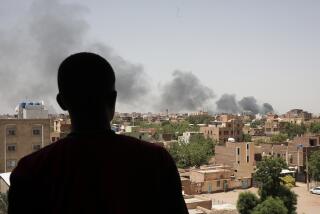One Good Option in Somalia
- Share via
The United States refuses to turn tail and run from Somalia. President Clinton, holding firm in the face of increased attacks on American soldiers, has ordered nearly 400 commandos--members of an elite Army Rangers unit--to Mogadishu to beef up the U.S. presence in the war-ravaged nation.
They will join more than 4,000 other U.S. soldiers and nearly 24,000 troops from 22 other nations involved in the U.N. operation there.
The Clinton Administration has no other reasonable option in Somalia. To retreat at this point would signal weakness in American resolve. It would jeopardize the very real gains that have resulted from last year’s American humanitarian intervention. A U.S. pullback would also endanger the international forces assembled by the United Nations to keep peace in Somalia.
Staying today, however, does not mean staying forever. U.S. troops should remain in Somalia only until the fugitive warlord Mohammed Farah Aidid is brought to justice. The followers of Aidid--only one among many warlords but considered the most powerful--have repeatedly ambushed foreign soldiers. Authorities believe that on Sunday Aidid’s men targeted six U.S. soldiers, wounded when their truck was destroyed by a remote-control bomb. Four U.S. soldiers were killed two weeks ago in a similar attack. Add to that body count the 23 Pakistani peacekeepers who were killed, also apparently by Aidid loyalists, shortly after the United States turned over command of the Somalia operation to the United Nations in June.
President George Bush sent American soldiers on a mission of rescue when he ordered them to Somalia; President Clinton insisted that they stay in order to stop the starvation that had claimed thousands of Somalis. Those American men and women succeeded. They opened supply routes and ended the theft of aid intended to relieve the suffering caused by civil war and famine. They should stay until the peace is less fragile.
Representatives of Aidid are now willing to talk, U.N. officials indicated Tuesday. Perhaps that dialogue--and the presence of a stronger U.N. force--can lead to the restoration of relative peace in Somalia. Only then should the United States be prepared to give ground.
More to Read
Sign up for Essential California
The most important California stories and recommendations in your inbox every morning.
You may occasionally receive promotional content from the Los Angeles Times.













